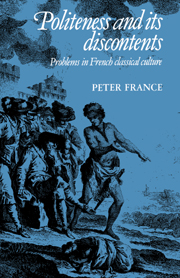Book contents
- Frontmatter
- Contents
- Acknowledgements
- Introduction
- PART I EXCESS AND UNREASON
- PART II ENLIGHTENED SOCIABILITY
- PART III CONFRONTING THE OTHER
- 9 Translating the British
- 10 Jacques or his master? Diderot and the peasants
- 11 Enlightened primitivism
- 12 Frontiers of civilization
- Notes
- Index
- Cambridge Studies in French
10 - Jacques or his master? Diderot and the peasants
Published online by Cambridge University Press: 20 October 2009
- Frontmatter
- Contents
- Acknowledgements
- Introduction
- PART I EXCESS AND UNREASON
- PART II ENLIGHTENED SOCIABILITY
- PART III CONFRONTING THE OTHER
- 9 Translating the British
- 10 Jacques or his master? Diderot and the peasants
- 11 Enlightened primitivism
- 12 Frontiers of civilization
- Notes
- Index
- Cambridge Studies in French
Summary
In Chapter 2, I asked how Charles Perrault adapted for the use of polite society material which had its origin in ‘les moindres familles’, those who lived in ‘des huttes et des cabanes’. The world of these families, the French peasantry of the ancien régime, has been massively studied over the last thirty years. In such investigations, it must be said, the historian has received little help from the polite literature of the day, for this largely ignored the life of the majority of the population. Only in the nineteenth century did French novelists begin to take peasant life seriously. Even then, moreover, the representation of the peasant world for middle-class readers had its difficulties – as is witnessed, for instance, by an interesting discussion of problems of linguistic decorum in rustic fiction in the introduction to George Sand's François le champi.
With such thoughts in mind, I want now to look at the practice of one enlightened representative of French elite culture of the eighteenth century, Denis Diderot. I shall ask how he saw peasant life from outside and above – or, to generalize, how a member of the polite minority saw the not-so-polite majority. What ways did he find of depicting them, and how much was his presentation determined by literary models? How true is it that for him the peasant, like the savage or the child, remained the Other?
First, a few reminders about peasant existence in eighteenth-century France, as modern historians have reconstructed it.
- Type
- Chapter
- Information
- Politeness and its DiscontentsProblems in French Classical Culture, pp. 173 - 186Publisher: Cambridge University PressPrint publication year: 1992



